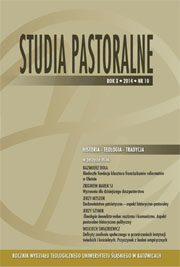Troska o język w liturgii przejawem duchowości chrześcijańskiej
Caring for a language in the liturgy as manifestation of Christian spirituality
Author(s): Andrzej ŻądłoSubject(s): Christian Theology and Religion
Published by: Księgarnia Świętego Jacka
Keywords: Christian spirituality; culture; faith; formation; liturgy; mystery; Word of God
Summary/Abstract: A contact with a liturgical language and preaching the Word of God during the liturgy is not only a contact with a teaching word of God, but most of all with the word that has a power to transform those who celebrate the liturgy. Dynamics of this impact differs from the dynamics of a human language, since the language of the Bible is equipped with the salvific power. It is not about the effectiveness analysed in the context of literature or psychology, but but in the context of the Holy Spirit, who in the act of proclamation of the Word of God acts on the faithful and sanctifies them. This sanctifying action of the Holy Spirit reaches its climax precisely in the liturgy (see: SC 10), however its is not limited to the very celebration. Hence the spiritual life of the faithful is not limited solely to their participation in the liturgy (see: Constitution on the sacred liturgy 12), but extends its interaction to every day Christian life modelled on the road composed of the Word of God, transferred as the spiritial food in the liturgy, which is the font of life of the whole Church and her activities (see: SC 10). This is why all the forms of care for a word, which creates – apart from symbols and gestures – one of the major pillars of the liturgy celebrated by the Church is, as the matter of fact, a manifestation of a care for Christian spirituality. The Word of God proclaimed during the liturgy that comes from His mouth (see: Mathew 4:4) should become one with everyday life attitudes of Christians, so that the visible effect of the symbiosis (inevitable for matured faith) was spirituality of followers of Christ – pilgrims who all their earthly lives search for things above, where Christ is seated at the right hand of God (Colossians 3:1). This is why the Word of God should be given an appropriate attention in the broadly understood meditation, reflection and discussion, since the dependancy between the care for a language in the liturgy and the Christian spirituality is interactive.
Journal: Studia Pastoralne
- Issue Year: 2014
- Issue No: 10
- Page Range: 351-362
- Page Count: 12
- Language: Polish

